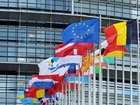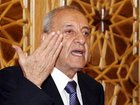Hizbullah chief Sayyed Hassan Nasrallah announced Wednesday that the fact that the parliamentary elections did not produce a clear parliamentary majority might be a good thing for the country in the wake of the polarization that accompanied the electoral campaigns.
 Full Story
Full Story
Lebanon was witnessing a host of renewed crises on Wednesday against the backdrop of a continuous surge of the dollar exchange rate on the black market.
“The flour crisis will grow and we will witness more queues outside bakeries,” Ali Ibrahim, the head of the Syndicate of Bakery Owners in Lebanon, told al-Jadeed TV, amid a shortage of Arabic bread in the market.
 Full Story
Full Story
The central bank has extended the implementation of Circular 161 until the end of July, allowing banks to continue to purchase dollars via the Sayrafa platform, Central Bank Governor Riad Salameh announced on Wednesday.
The circular, which has been in place since January, allows commercial banks to buy U.S. dollars from the central bank with the Lebanese pounds that they or their clients have, based on an exchange rate specified by the Sayrafa platform, which is usually lower than that of the black market.
 Full Story
Full Story
Hizbullah and the Amal Movement urged supporters Wednesday not to stage motorbike rallies while calling on all political parties to “return to the approach of dialogue and rapprochement in order to overcome the suffocating economic and financial situation.”
“While the Amal Movement and Hizbullah understand the sentiments of their supporters after all the incitement, polarization and provocations that preceded the parliamentary elections, and as they express gratitude for all the displays of joy and celebration over the results of these elections, they call on their supporters not to stage motorbike rallies… so that some fanatic or nervous individuals do not take things to places that distort the electoral success,” the two parties said in a joint statement.
 Full Story
Full Story
Hizbullah's opponents might rejoice at their loss of majority in parliament but Lebanon's packed political calendar now sets the stage for protracted deadlocks at best or violence at worst.
 Full Story
Full Story
President Michel Aoun returned Wednesday morning to the Baabda Palace after being discharged from the Hôtel-Dieu de France hospital in Beirut, the Presidency said.
The Presidency added that Aoun left hospital “after the completion of the medical checkups and x-rays that he underwent yesterday.”
 Full Story
Full Story
Marada Movement chief Suleiman Franjieh on Wednesday admitted that his Movement “barely made it” in Sunday’s parliamentary elections, which witnessed the defeat of several prominent figures from Franjieh’s Hizbullah-led political camp.
 Full Story
Full Story
The European Union has welcomed the holding of parliamentary elections in Lebanon on May 15, commending the Lebanese people, those who voted and those who were involved in preparing and implementing the electoral process, for “their civic participation, despite the difficult political, economic and social circumstances surrounding these elections.”
“We also commend the state security forces for their contribution to maintain a calm and safe environment overall, and help in ensuring that the elections were conducted without major security incidents,” EU High Representative for Foreign Affairs and Security Policy Josep Borrell said in a statement distributed by the EU Delegation to Lebanon.
 Full Story
Full Story
Parliament Speaker and Amal Movement leader Nabih Berri on Tuesday called on all forces that competed in the parliamentary elections to "respect the choices of the people" who voted.
 Full Story
Full Story
Following the completion of Lebanon’s parliamentary elections, the British Embassy in Beirut called on the new parliament to “proceed urgently to form an inclusive new government that is empowered to take forward the essential reform agenda,” including finalizing the agreement with the International Monetary Fund to “get Lebanon on the path to recovery.”
 Full Story
Full Story



